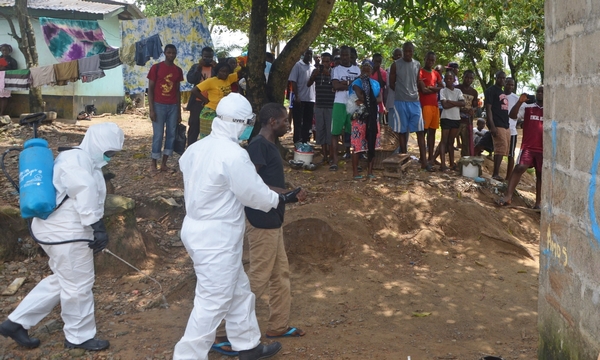There is a real possibility that Ebola could mutate into a virus that is as spreadable as the flu, one of the nation’s top Ebola researchers tells Newsmax Health.
“I don’t want to be an alarmist, but the possibility of
Ebola becoming an airborne virus clearly has to be taken
into account,” said David Sanders, associate professor
of biological sciences at Purdue University.
"Ebola does share some of the characteristics of
airborne viruses like influenza and we should not
disregard the possibility of it evolving into something
that could be transmitted in this way,” added Sanders,
whose work on Ebola led to his participation in the U.S.
Defense Threat Reduction Agency's Biological Weapons
Proliferation Prevention Program.
U.S. health officials have largely dismissed Ebola as
posing a major threat inside American borders.
Testifying before a Congressional subcommittee this
week, Dr. Anthony Fauci, a top White House infectious
disease advisor, said it was very unlikely Ebola would
mutate in a way that would make it transmittable through
the air like flu.
That’s “not something I would put at the very top of the
radar screen,” he said.
But Sanders disagrees. “I want the facts to be clear.
It’s important that we not get the idea that this can’t
happen,” he said, adding, “When people say that it is
impossible for this virus to mutate, this is simply not
true.”
Editor's Note:
From the Bible:
Miracle Food Cures
According to Sanders, a key factor in the successful
mutation of a virus centers on how it enters and exits
the body. Sanders led a research team that established
the Zaire form of the Ebola virus, which is the one
involved in the West Africa epidemic, could enter the
mucus-lined cells that line the human airway in much the
same way the flu virus does.
He pointed to the flu as an example of how a virus can
mutate so that it can infect different species and be
transmitted in different ways.
Originally, flu was a virus that lived in the
gastrointestinal tract of aquatic birds, like ducks and
geese. But it mutated into a disease that spread easily
among humans, gaining entry to the human body through
airways, which have a mucus lining that is similar to
that in the gastrointestinal tract of birds.
To pose a major threat in the U.S., the Ebola virus
would have to mutate so that it could survive outside
the body for a significant length of time like influenza
can, Sanders said.
“This is not how the Ebola virus is currently known to
spread, but there is evidence that it has some of the
necessary components for respiratory transmission,” he
said.
The more the West Africa epidemic spreads, the more
likely it is that the virus will mutate. This is why it
is important the outbreak be contained now, even though
it hasn’t yet reached American shores, he said.
Editor's Note:
From the Bible:
Miracle Food Cures
“When people have looked at the current outbreak, the virus
really hasn’t changed much,” Sanders said. “However,
this research was done when there were 1,500 cases and
now it’s up to 4,000 and if it gets to be 100,000 cases,
there is more and more of a chance for mutations to
occur.”
There is no way to forecast when or if Ebola will dangerously
mutate, he said.
“I can’t calculate you the probability of this
happening. I can just tell you that from the way the
virus enters the body, this is a possibility and that
clearly has to be taken into account,” Sanders added.
He pointed to another strain of the Ebola virus that has
already mutated to become transmittable through the air.
In fact, it has already hit the U.S., although it turned
out to be non-lethal to humans. The disease was dubbed
Ebola-Reston because its initial outbreak occurred in
Reston, Va., in 1989.
The outbreak stemmed from a shipment of
infected macaques imported
from the Philippines. The disease spread from the
macaques to other monkeys housed at a quarantine
facility. The infected monkeys all died and four workers
at the quarantine facility tested positive for the
disease. Surprisingly, the workers never got sick.
A later outbreak occurred in Texas. Ebola-Reston is the only one
of the five forms of Ebola not harmful to humans.
However, it does show that a virus in the Ebola family can be
spread through the air. “There is good evidence that it
spread through a respiratory route,” said Sanders.
If the Ebola strain in West Africa does go airborne, it
could be a global catastrophe, experts say. According to
one prediction by Michigan State University professor
Francis Smart, 1.2 million would die from the disease.
Smart says it is “extremely foolish” for any nation
think they are immune from Ebola.
The Ebola outbreak raging in West Africa has now claimed
more than 2,600 lives and that number is expected to
greatly increase before the epidemic can be contained.
